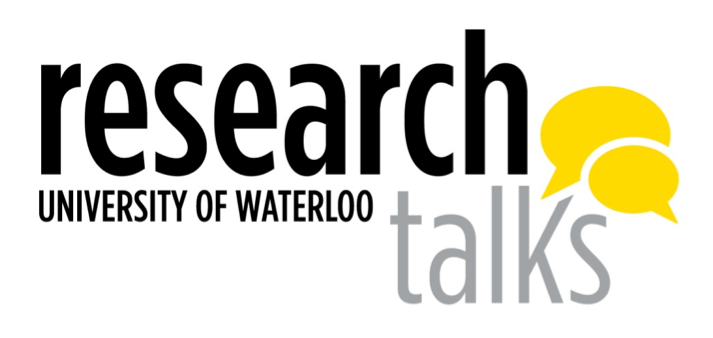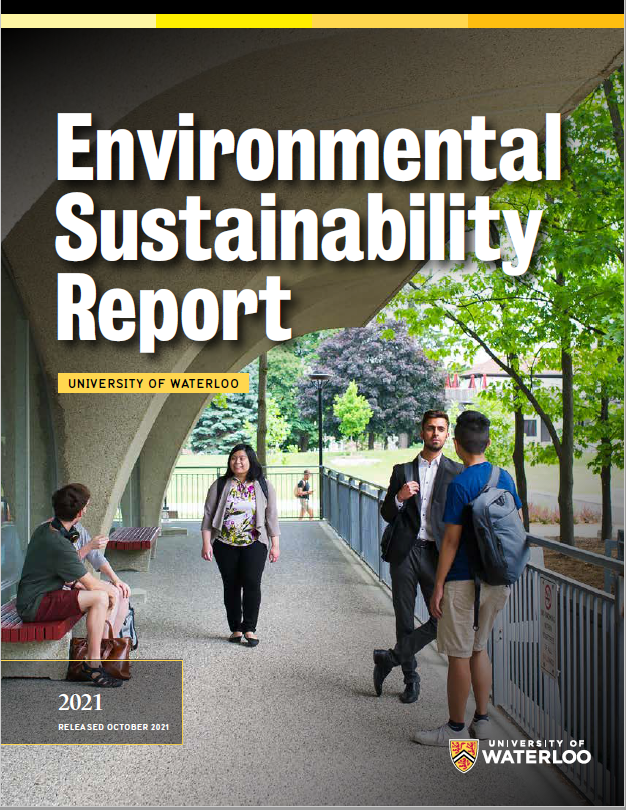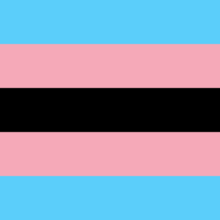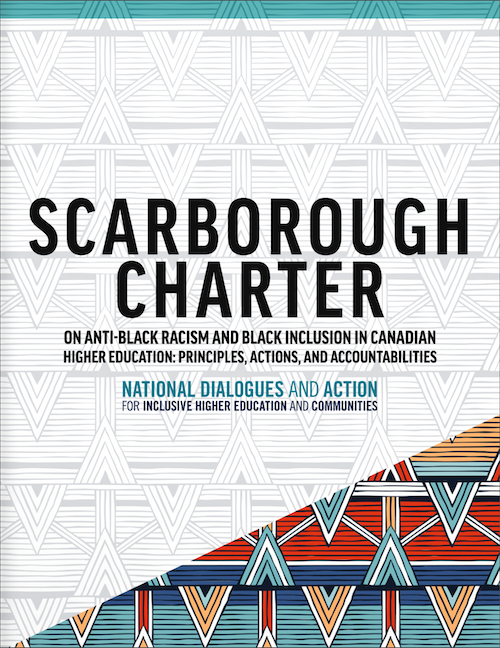Editor:
Brandon Sweet
University Communications
bulletin@uwaterloo.ca
Register for Monday’s online Research Talks about the workplace revolution

Interested in the future of employment? To learn more, don’t forget to register for the fall 2021 Research Talks virtual panel presentation and discussion taking place on Monday, November 22 from 11:45 a.m. to 1:15 p.m. "The Workplace Revolution: Envisioning the Future of Employment," will feature four panelists, including two University of Waterloo professors, Joel Blit (Economics) and Ellen MacEachen (School of Public Health Sciences), as well as Stephen Harrington (Deloitte) and Rohinton P. Medhora (CIGI).
Please register to receive a link to take part in this event.
Research Talks is supported by the Research Support Fund.
Waterloo releases 2021 Sustainability Report

The President’s Advisory Committee on Environmental Sustainability has released the 2021 Environmental Sustainability Report, which tracks progress, celebrates successes, and highlights improvement areas over the past year. The seventh annual report monitors the implementation of objectives from Waterloo’s Environmental Sustainability Strategy and the Shift: Neutral climate action plan.
“Obviously, the past two years have seen significant disruption to the campus,” says Mat Thijssen, Director of Sustainability. “The 2021 report tracks how we are implementing Waterloo’s sustainability commitments, and provides context on how the pandemic has both opened new opportunities and intensified some challenges.”
The report features case studies on various sustainability topics, as well as key performance indicators tied to Waterloo’s objectives. It also updates the interactive datasets which allow users to explore more information on performance on areas such as carbon emissions, waste, and water, as well as teaching and research activity.
Read the full sustainability report on the Sustainability Office webpage, and register for the annual Eco-Summit, next Wednesday, November 24 from 10:00 a.m. to 11:00 a.m., which will more formally present some of the updates and case studies.
Nine Waterloo researchers among the most cited in the world

By Sam Toman.
A major annual publication has recognized nine University of Waterloo faculty members as being among the most cited in the word.
A list published by the global analytics firm Clarivate identifies researchers who demonstrated “significant influence in their chosen field or fields through the publication of multiple highly cited papers during the last decade.” Their names are drawn from the publications that rank in the top one per cent by citations for field and publication year in the company’s global citation index.
The methodology that determines the “who’s who” of influential researchers draws on the data and analysis performed by bibliometric experts and data scientists at the company.
The University of Waterloo researchers on this year’s list are:
As a Canada Research Chair in Advanced Materials for Clean Energy and Professor in the Faculty of Engineering’s Chemical Engineering department, Chen’s work is at the interface of science and engineering. His focus is in using nanomaterials for advancing technologies important to alternative energy and environment needs.
An acclaimed psychologist in the Faculty of Arts whose research focuses on combining psychological theories and research methods with traditional epidemiological survey methods to evaluate the impact of tobacco control policies on entire populations in countries. He is the founder and Chief Principal Investigator of the International Tobacco Control Policy Evaluation Project and a member of the Royal Society of Canada, Canadian Academy of Health Sciences and the Association for Psychological Science.
A distinguished professor emeritus and adjunct professor in the Faculty of Science’s Department of Biology, Glick researches plant-microbial interactions. His findings include discovering how certain bacteria can help plants grow, even under stressful conditions, such as drought. With over 52,000 citations, and nearly 400 publications, the professor has one of the highest citation records at the University of Waterloo.
Hammond is a professor in the School of Public Health Sciences in the Faculty of Health. His research focuses on chronic disease prevention and global health in three main areas: tobacco/vaping, nutrition policy, and cannabis and harm-reduction policy. He also led large international studies to examine consumer trends and to evaluate the impact of national-level interventions, including restrictions on marketing, product standards, health warnings, and retail policies.
An agricultural sciences expert on nutrition from the School of Public Health Sciences, she also a member of the Interdisciplinary Centre on Climate Change and the Waterloo Institute for Complexity and Innovation. Much of her work is aimed at improving methodologies for measuring dietary patterns and how these patterns influence human and planetary health.
A professor in the Faculty of Science’s Department of Chemistry. Her research in inorganic materials chemistry, solid-state chemistry and electrochemistry is focused on building a low-cost battery that can provide power for longer periods of time.
Percival is a professor in the Faculty of Science, a Distinguished Research Chair in Astrophysics and founding director of the Waterloo Centre for Astrophysics. His research focuses on the properties of the Universe on the largest scales. His surveys of three-dimensional galaxy positions provide data on the physics just after the Big-Bang, and on the physics driving the evolution of the Universe today.
As an expert on climate change and tourism, Scott is a University Research Chair and leads the Master of Climate Change Program at Waterloo. His research in the Faculty of Environment’s Geography department develops our understanding of the implications of a changing climate for tourism at the tourist, operator, destination and tourism region scales. He is also a member of the Interdisciplinary Centre on Climate Change.
A professor in Electrical and Computer Engineering, Shen specializes in wireless communications and networking. He is a fellow of the Institute of Electronics and Electrical Engineers, Royal Society of Canada, Canadian Academy of Engineering as well as the Engineering Institute of Canada.
These researchers are in rare company: In 2021, fewer than 6,700–or about 0.1 per cent–of the world's researchers in 21 research fields and across multiple fields have earned this exclusive distinction.
The full 2021 Highly Cited Researchers list and executive summary can be found online.
Trans Awareness Week 2021
A message from the Equity Office.

This week is Trans Awareness week, which includes Trans Day of Remembrance (November 20). This week is a time dedicated to increasing visibility and awareness of transgender communities and their resilience, without ignoring the ongoing discrimination they encounter.
Explore this non-exhaustive list of events, resources, and voices compiled to amplify visibility and our collective understanding on campus.
New workshop offered
Join facilitators Teneile Warren and Sarah Grzincic on December 2 from 10:00 a.m. to 12 noon for a newly-offered Equity Office workshop - Unlearning the Binary: Fostering a Truly Trans-Inclusive Campus. This workshop is open to students, faculty and staff, and aims to:
- foster an understanding of the historical and present-day issues impacting trans and non-binary Black and racialized identities;
- debunk and de-mystify conversations around transinclusion; and
- generate discussion on accountability frameworks and best practices to better affirm transidentities. Learn more and register.
Thanks especially to SPECTRUM and the Glow Centre for their commitment to honouring and organization ofevents/vigils for Trans Awareness Week and Trans Day of Remembrance.
Image credit: Raquel Willis.
Scarborough Charter signing event today and other notes

The University of Waterloo will join more than 40 other institutions of higher learning in becoming a signatory to the Scarborough Charter on Anti-Black Racism and Black Inclusion in Canadian Higher Education. The virtual signing ceremony takes place today from 3:00 p.m. to 4:00 p.m.
The Charter, through its principles, actions, and accountabilities, provides a unified framework for confronting anti-Black racism within higher education institutions in Canada. Signatories commit to redressing anti-Black racism and fostering Black inclusion through a number of collaborative commitments and measures.
"Healthy vision is crucial at every stage of life," says a note from the School of Optometry and Vision Science that is interested in learning more about how the public wants to receive health information.
"The researchers are interested in your opinion and are hoping that you would be willing to complete a short (approximately 5-10 minutes) survey," says the survey email. "All responses are anonymous."
The survey is available online using this link: https://redcap.link/EyeCareLiteracy_survey
This study has been reviewed and received ethics clearance through a University of Waterloo Research Ethics Committee (ORE# 41998). If you have questions for the Ethics Committee contact the Office of Research Ethics, at 1-519-888-4567, ext. 36005 or ore-ceo@uwaterloo.ca.
If you have any other inquiries regarding this project, you may contact Dr. Elizabeth Irving, who leads the research team, at Elizabeth.irving@uwaterloo.ca or +1 (519) 888-4567 x 35529.

W3+ Circle issues call for proposals: "Waterloo Womxn + Nonbinary Wednesdays (W3+) is a community of womxn and nonbinary grad students, post-docs, staff, and faculty that meets on the last Wednesday of the month and holds one full-day gathering each year," says a note from W3+. "W3+ is seeking proposals for “W3+ Circle” on February 23, 2022."
"The circle of life is a concept found in many religious and cultural traditions noting how life is cyclical," says W3+. "Many non-Western peoples operate with the circle as a dominant symbol for its appearance in nature and as a format for traditional ceremonies. Decolonial pedagogies and ways of being use circle as a mode of coming together to break hierarchies and aim for inclusive participation. Feminism also has embraced the power of circle, as being in a circle requires centring the role of the body as form of testimony and engagement and as part of a community. Mandalas, healing circles, medicine wheels, drumming circles, yin/yang, circle dances—all find their inspiration through the geometry of the sacred circle. Historically, the circle has been an important pathway to understanding and renewal that is essential to making connection, building community, and disrupting traditional models of leadership."
"W3+ Circle will be a day-long schedule of sessions for the W3+ community to come together in circle. W3+ Circle is open to all womxn and nonbinary graduate students, faculty, staff, and post-docs. W3+ is accepting proposals until December 1 for sessions that centre the circle as the format through which to connect and unite people. Any topic is welcome that demonstrates how the circle format is useful in bringing people together."
For example:
- Healing, Support, and Sharing Circles on various topics
- Writing or Reading circles where papers are exchanged and discussed
- Black/racialized womxn and nonbinary circle to share stories and lived experiences
- Book/reading circle where a piece of literature is assigned and discussed
- Queer W3+ folk unite
- Surviving sexual harassment in the workplace
- How to create and cook over a fire
Link of the day
When and Where to get support
Students can visit the Student Success Office online for supports including academic development, international student resources, immigration consulting, leadership development, exchange and study abroad, and opportunities to get involved.
Instructors looking for targeted support for developing online components for blended learning courses, transitioning remote to fully online courses, revising current online courses, and more please visit Agile Development | Centre for Extended Learning | University of Waterloo (uwaterloo.ca).
Instructors can visit the Keep Learning website to get support on adapting their teaching and learning plans for an online environment.
Course templates are available within your course in LEARN to help you build and edit your content and assignment pages quickly.
The following workshops, webinars, and events are offered by the KL team (CTE, CEL, ITMS, LIB):
- Independent Remote Course Design Essentials, self-directed, continuous self-enrollment course in LEARN.
- Independent Blended Course Design (iBlend), self-directed, ongoing
- Copyright Overview for Waterloo Instructors and Staff - self-directed, continuous self-enrollment course in LEARN.
-
Thirty Minute Thursdays– PebblePad – Offered:November 18, November 25, 12:00 noon to 12:30 p.m.
-
Integrating PebblePad Retreat (IPR) -Setting up your Winter 2022 PebblePad Assignments and Activities (CTE 7531) - December 7, 1:00 p.m.
Employees can access resources to help them work remotely, including managing University records and privacy of personal information. Here are some tips for staying healthy while working from home.
Stay informed about COVID cases on campus by consulting the COVID case tracker.
The Writing and Communication Centre has virtual services and programs to help undergrads, grad students, postdocs and faculty members with academic writing.
- Meet with writing advisors in one-to-one appointments to brainstorm, draft, revise, and polish. No time for an appointment? Try email tutoring for undergrads.
- Beat isolation and make writing progress at weekly Virtual Writing Cafés for grad students and faculty or PJ-Friendly Writing Groups for Undergrads.
- Take an online workshop or apply to our popular Dissertation Boot Camp program.
- Faculty can request custom in-class workshops for their courses, or the WCC can facilitate any existing workshops for student groups.
Co-op students can get help finding a job and find supports to successfully work remotely, develop new skills, access wellness and career information, and contact a co-op or career advisor.
The Centre for Career Action (CCA) is offering some in-person services for fall 2021. The Tatham Centre is open with front-desk support, limited in-person appointments and co-op consults. Services are also available virtually. Book an appointment online or Live Chat with our Client Support Team. The CCA is here to help.
If you feel overwhelmed or anxious and need to talk to somebody, please contact the University’s Campus Wellness services, either Health Services or Counselling Services. You can also contact the University's Centre for Mental Health Research and Treatment. Good2Talk is a post-secondary student helpline available to all students.
While the Library continues to focus on digital resources and consultations, our spaces are open for the fall term. Dana Porter Library is open Monday to Friday, 9 a.m. to 5 p.m., and Davis Centre Library is open Monday to Friday, 9 a.m. to 11 p.m., and Saturday and Sunday, 11 a.m. to 5 p.m. for drop-in individual study space, bookable individual study rooms, drop-in access to computers and printers, book pick-up services and IST Help Desk support. Special Collections & Archives and the Geospatial Centre will be accessible by appointment. Library staff are available for questions via Ask us. Full details on current services and hours are available on the Library’s COVID-19 Update webpage.
The Faculty Association of the University of Waterloo (FAUW) continues to advocate for its members. Check out the FAUW blog for more information.
The University of Waterloo Staff Association (UWSA) continues to advocate for its members. Check out the UWSA blog for more information.
The Sexual Violence Prevention and Response Office (SVPRO) supports all members of the University of Waterloo campus community who have experienced, or been impacted, by sexual violence. This includes all students, staff, faculty and visitors on the main campus, the satellite campuses, and at the affiliated and federated Waterloo Institutes and Colleges. For support, email: svpro@uwaterloo.ca or visit the SVPRO website.
The Office of Indigenous Relations is a central hub that provides guidance, support, and resources to all Indigenous and non-Indigenous campus community members and oversees the University's Indigenization strategy.
The Waterloo Indigenous Student Centre, based at St. Paul’s University College, provides support and resources for Indigenous students, and educational outreach programs for the broader community, including lectures, and events.
WUSA supports for students:
Peer support - MATES, Glow Centre, RAISE, Women’s Centre - Visit https://wusa.ca/peersupport to book an appointment either in person or online for the Fall term!
Food Support Service food hampers are currently available from the Turnkey Desk 24/7 in the Student Life Centre. Drop off locations are also open again in SLC, DC, DP, SCH and all residences.
Co-op Connection all available online. Check https://wusa.ca for more details.
Centre for Academic Policy Support - CAPS is here to assist Waterloo undergraduates throughout their experience in navigating academic policy in the instances of filing petitions, grievances and appeals. Please contact them at caps@wusa.ca. More information is available.
WUSA Student Legal Protection Program- Seeking legal counsel can be intimidating, especially if it’s your first time facing a legal issue. The legal assistance helpline provides quick access to legal advice in any area of law, including criminal. Just call 1-833-202-4571.
Empower Me is a confidential mental health and wellness service that connects students with qualified counsellors 24/7. They can be reached at 1-833-628-5589.
When and Where (but mostly when)
Healthy Warriors at Home (Online Fitness)
Warriors vs. Laurier Blood Donation Battle. Join your fellow Warriors, donate blood and help us win the Blood Battle against Laurier for a second year in a row. Set up a profile or add the PFL code: UNIV960995 to your account if you have a blood.ca account already. Questions? Contact WarriorsInfo@uwaterloo.ca.
Drop-in to Warrior Virtual Study Halls on Wednesdays from 5:30 p.m. to 7:00 p.m. Come together in this virtual space to set goals and work independently or in groups each week.
Renison English Language Institute continues to offer virtual events and workshops to help students practice their English language skills.
Brubacher House Digital Exhibit Opening, “Life Upstairs: Stories from Brubacher House,” Thursday, November 18, 7:00 p.m., Virtual (Zoom).
NEW - IT Seminar: The Quest in Cloud Project, Friday November 19, 9:00 a.m. to 9:45 a.m. Join online.
Research Talks: The workplace revolution: Envisioning the future of employment, Monday, November 22, 11:45 a.m.
2021 Sally Weaver Award Guest Lecture: “Uncertain Waiting, Uncertain Methodologies: Anthropology of Asylum and Borders", Monday, November 22, 12:30 p.m. Zoom Event. Registration required.
CrySP Speaker Series on Privacy featuring Wouter Lueks, EPFL, “Privacy-friendly presence and proximity tracing,” Wednesday, November 24, 11:00 a.m.
NEW - W3+ presents Shop & Plan Meals Like a Dietitian, Wednesday, November 24, 11:30 a.m. to 12:30 p.m., online.
NEW - WaterTalk: Microplastics and Human Health: Moving the Field Forward, presented by Juliette Legler, Utrecht University, The Netherlands. Thursday, November 25, 10:00 a.m.
NEW - How I Got Into Quantum: A Graduate Student Perspective, Thursday, November 25, 4:00 p.m., Virtual Panel, streamed live to YouTube.